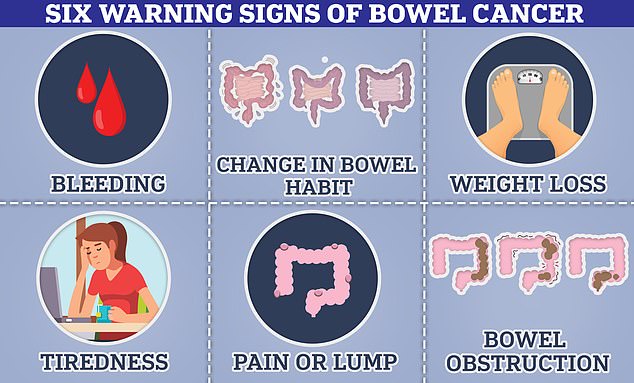It is a phenomenon that has baffled doctors around the world: bowel cancer, a disease that usually affects the elderly, has increased by 50 percent among people in their twenties, thirties and forties over the past 30 years.
Now, in a fascinating discussion between two of the world’s leading cancer experts, a new theory has been put forward to explain this trend.
While acknowledging there are likely “several” contributing factors, leading experts have suggested a common childhood infection could be partly to blame.
In an interview with The Health Foundation, Dr Charles Swanton, clinical director at Cancer Research UK, spoke of “emerging data” showing that a specific type of E. coli bacteria could “contribute to at least some of the cancer initiation processes”.
He added that the infection, which causes symptoms of food poisoning, has been shown to trigger mutations in blood vessels in the gut that could drive the development of tumors.
Bowel cancer can cause blood in the stool, a change in bowel habits and a lump in the bowel that can cause blockages. Some people also experience weight loss as a result of these symptoms.


Leading medical oncologists Kimmie Ng (left), a specialist oncologist and director of the Early-Onset Colorectal Cancer Centre at the Dana Farber Cancer Institute in Boston, and Charles Swanton (right), senior physician at Cancer Research UK, discuss what’s behind this worrying rise.
Dr. Kimmie Ng, an oncology specialist and director of the early-onset colorectal cancer center at the Dana Farber Cancer Institute in the U.S., echoed Dr. Swanton’s comments.
She replied: “That finding is really provocative and very interesting,” adding that infection is likely a “very early event” in someone’s life.
‘This is consistent with our hypothesis that any exposures or inciting factors that are occurring are likely happening in the first few years of life.
Supporting this theory are Dr Ng’s disturbing claims that many of her colorectal cancer patients are actually children.
Dr Ng said she has started seeing more children with the disease at her own clinic than ever before.
“While there’s not necessarily published data on the rate of increase and whether it’s affecting the pediatric population, at least anecdotally I’ve been seeing some children with colorectal cancer,” she said.

Data from JAMA Surgery showed that colon cancer is expected to increase by 90 percent in people between the ages of 20 and 34.
He added that thyroid cancer has also been increasing, as well as kidney cancer, which is also on the rise among young people.
The type of E. coli that experts identified is a specific strain known as PKS-positive E. coli.
It is not linked to outbreaks of food poisoning, but is thought to develop through interactions with the trillions of microbes in our gut.
Scientists aren’t entirely sure how PKS-positive E. coli develops, but a 2022 study found an association between the presence of the bacteria in colorectal cancers and Western-style diets.
A 2020 study A study published in the journal Nature suggested that a person’s likelihood of developing bowel cancer may increase after being infected with this specific type of E. coli.
Scientists believe the bacteria, thought to be present in one in five people, releases a toxin that can damage cells lining the gut. The study claims this can cause some cells to become cancerous over time.
Although our junk food-laden diets, smoking and obesity are often blamed for the rise in cancer, experts say it’s far more likely that these subtle changes in gut bacteria are a major contributing factor.
Dr Ng says that in her experience, many of her patients are young and not obese.
In fact, many young people diagnosed with bowel cancer lead healthy and active lifestyles, suggesting that it is not just obesity that is responsible for this increase in cases.
“Many are triathletes and marathon runners, so it’s really puzzling why this happens,” he said.
‘What I mean is that the hypothesis that has been put forward is that the reason the incidence is increasing across all digestive system cancers is this common theme of obesity as a risk factor.
“But I haven’t seen that same thing in the patients I’ve treated.”
Dr. Swanton added that while many scientific studies say obesity is a major risk factor for early onset colorectal cancer, he suggests this is not always the case.
He said: “My impression, at least clinically, is that that argument doesn’t always bear fruit and that many of these early-onset cancers are associated with individuals who are neither obese nor overweight.”
MailOnline has repeatedly documented the global rise in bowel cancer among young people.
Perhaps the most recognisable victim of this trend is Deborah James, known as “the gut girl”, who was diagnosed with the disease at just 35 and raised millions for charity in her final days in 2022.
The analysis suggests that overall bowel cancer deaths in the UK will rise by 2,500 a year between now and 2040.
Meanwhile, the number of people in the UK diagnosed with the disease is set to rise by around a tenth over the same period.
Bowel cancer currently kills almost 17,000 Britons every year and only half of those diagnosed are expected to survive 10 years after learning they have the disease.


